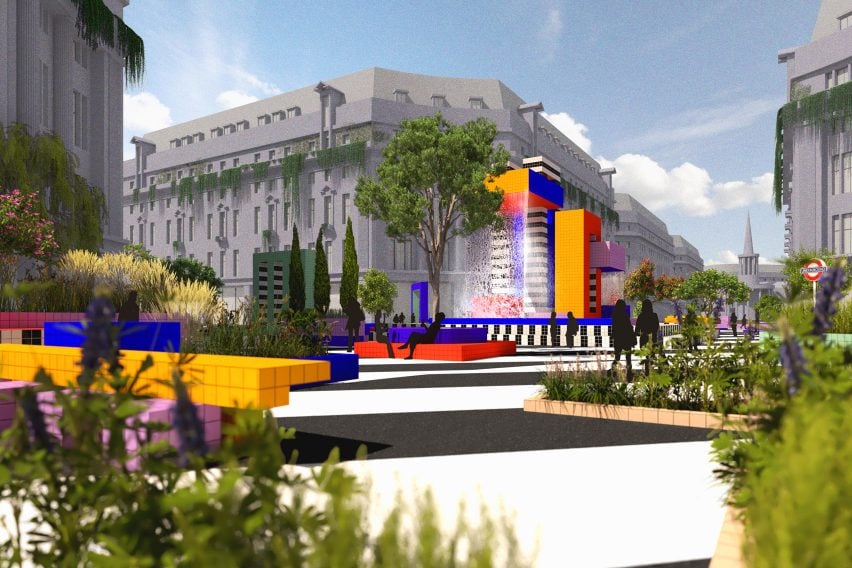
Camille Walala shares colourful vision to make Oxford Street a car-free shopping district
French designer Camille Walala has reimagined London's Oxford Street as a car-free landscape, filled with blocky street furniture finished in her signature colourful style.
The eccentric proposal also envisions the use of patterned plant pots and geometric water features to convert the capital's busiest shopping street into a fully pedestrianised area.
Described by Walala as a "what-if portrait of the city of tomorrow", the goal of the project is to demonstrate how colour and nature could be used to create more joyful and sustainable cities.

Walala's proposal was sparked by her experience of living in London during the first national lockdown in the UK caused by the ongoing coronavirus pandemic.
Throughout this period, she enjoyed cycling through London streets that were free from traffic or had been remapped to prioritise pedestrians and cyclists. Though these changes were the result of social distancing, it led Walala to imagine a future where the capital's roads were repurposed.

"At the beginning of lockdown earlier this year, I was cycling around the city with my partner, Julia," Walala explained in a letter accompanying the project.
"We were struck by the silence of the streets, the sense of peace that had descended on London in the absence of the traffic, and we started talking about how cities might be fundamentally different."
"This project is my what-if portrait of the city of tomorrow, and my own projection of what the London I love might one day look like," Walala continued.
"In times such as these, when the future is uncertain, strain on mental health is high, and many of us are facing tough challenges in our lives, I believe it's crucial to hang on to what hope we can for the future, and to spread joy in the present."

The centrepiece of Walala's proposal is a giant water fountain, composed of several interlocking geometric blocks.
This fountain is elevated on a stripy monochrome platform and enveloped by circular seating areas, alongside rectangular plant pots and small tubs containing trees.

The idea of pedestrianising Oxford Street has been in the spotlight for several years, with London mayor Sadiq Kahn planning to impose traffic restrictions there in 2018 – though this scheme was later rejected.
Zaha Hadid Architects imagined banishing cars from the road in 2018 as part of its Walkable London proposal, for which it envisioned a network of pedestrian routes that would allow people to walk right across the capital.
With car use rising as people avoid public transport due to the pandemic, some London boroughs are introducing Low Traffic Neighbourhoods to prevent drivers from taking shortcuts through residential streets. One of these boroughs is Hackney, which has introduced LTNs as part of a plan to become a net-zero emissions borough by 2040.
Elsewhere in London, Walala recently overhauled an entire block in east London with a large-scale mural, shortly after transforming two pedestrian crossings and a building facade in White City.
Visuals are by Walala with OmniVisual.